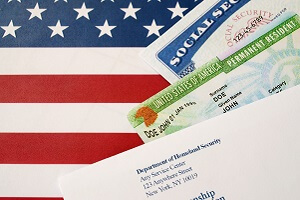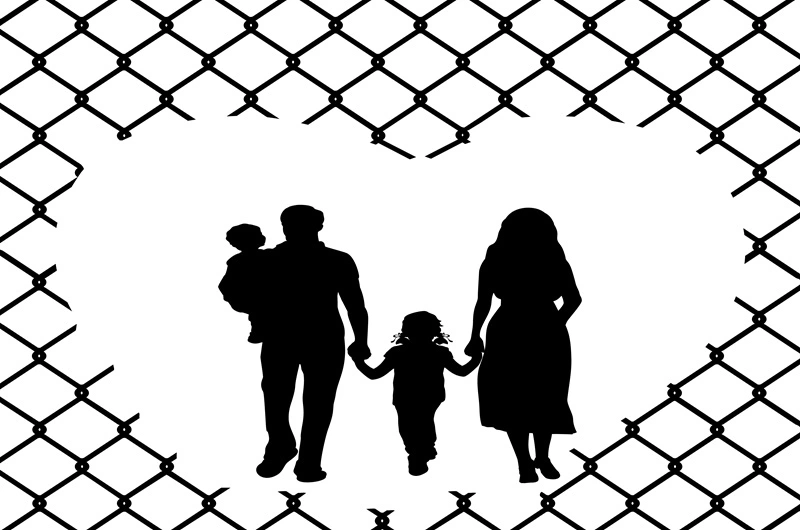Green Card Denied? Immigration Lawyer Offers Options
Receiving a denial notice for a Green Card application can feel like your world has turned upside down. You have invested time, effort, and emotions into the process, only to face a closed door. However, a denial doesn’t mean it’s over. Knowing the next steps with the help of an immigration lawyer for Green Card becomes critical.
This article outlines your legal options after receiving a denial and guides you through the appeal process. Discover potential reasons for the unfavorable result and learn how to move forward with proper support.

Difference Between Rejection & Denial Of Application
Rejection and denials represent two distinct outcomes for a Green Card petition. A rejection occurs when the request is incomplete or improperly submitted, often due to missing documents or incorrect information. The U.S. Citizenship and Immigration Services (USCIS) returns the application without review, allowing you to correct the errors and resubmit.
Meanwhile, a denial happens after the USCIS reviews the application and determines it lacks qualification or legal compliance. This decision typically results from failing to meet admissibility or specific eligibility requirements. Unlike rejection, denial can lead to an appeal or motion and requires a detailed response.
When USCIS issues a denial or revocation notice, they usually provide information on your right to appeal. Understanding the reasons for these unfavorable decisions becomes essential for planning your next steps.
Possible Reasons For A Denied Green Card Application
Facing a denial can be frustrating, especially when you’re unsure what went wrong. Understanding the reasons behind an application denial is the first step toward addressing the problem and moving forward. Identifying common causes can help you strengthen your appeal or avoid pitfalls in the future.
Incomplete Or Incorrect Documentation
Even minor errors, such as forgetting a signature or omitting important documents, can lead to denial. A single unchecked box, misspelled information, or missing form can mean starting over. Ensure thoroughness and accuracy in your application to avoid setbacks.
Failure To Meet Eligibility Requirements
Eligibility requirements vary based on the type of Green Card, such as family-based and employment-based. Insufficient evidence of eligibility can be an obvious reason for denial. For example, when applying for a family-based Green Card, you must prove the legitimacy of your relationship. Solid documentation prevents risks in your application.
Inadmissibility Issues
Certain factors automatically make applicants ineligible for a Green Card, such as a criminal record, past immigration violations, or specific medical conditions. These grounds for inadmissibility under U.S. immigration law can lead to high chances of denial. However, you may find available waivers to address these issues in certain cases.
Fraud Or Misrepresentation
If USCIS discovers false information or fraudulent documents in your application, it will likely deny it and may impose severe consequences. Fraud or misrepresentation can lead to permanent bars from reapplying. Always ensure honesty and transparency in your submissions.
Understanding these reasons is vital when preparing for the next steps. If you need to challenge the decision, consider consulting a skilled Green Card attorney who can guide you through your legal options.
Legal Options To Counter A Denial
You can contest a denial notice through several legal options, depending on the specifics of your case. You can take action, whether you present new evidence, challenge a legal error, or file an appeal. The path forward requires timely action and a clear understanding of your rights.
File A Motion To Reopen Or Reconsider
If new facts have surfaced or you believe the denial resulted from a misunderstanding, you can file a motion to reopen or reconsider. These motions ask USCIS to review the denial.
You file a motion to reopen when new facts or changed circumstances arise after the denial. For example, if you’ve obtained affidavits or additional documentary evidence that strengthens your case, reopening your application may help.
A motion to reconsider focuses on legal errors, arguing that USCIS made the wrong decision due to a misinterpretation of the law or facts. In this case, you don’t provide new evidence but claim that the original decision was legally flawed.
Both motions must be filed within 30 days of the decision date. If the decision was mailed, you have 33 days to respond. USCIS may extend the filing deadline if you prove the delay was reasonable and beyond your control.
Appeal To The Administrative Appeals Office
You can appeal the decision to the Administrative Appeals Office (AAO) for certain Green Card denials. The USCIS office that issued the original decision first reviews your appeal and may approve the application or forward it to the AAO.
The AAO then evaluates whether the denial was correct and has the authority to overturn the original decision. However, not all denials qualify for an appeal through the AAO. You must check your denial notice to confirm if this option is available.
Filing an appeal does not delay the decision’s effect and follows a strict timeline. You must submit Form I-290B, the Notice of Appeal or Motion, within 30 days of the denial. Missing this deadline will likely forfeit your opportunity to have the AAO reconsider the decision.
Request A Review By The Board Of Immigration Appeals
If a Department of Homeland Security (DHS) officer denies your application, you can request a review by the Board of Immigration Appeals (BIA). To start the appeal, you must file Form EOIR-29, Notice of Appeal to the Board of Immigration Appeals from a Decision of a DHS Officer. This form requires specific details about your original application.
You must submit Form EOIR-29 to the DHS, not directly to the BIA. If a DHS officer handed you the denial in person, you have 30 days to file the appeal. If the denial was mailed, the appeal must reach the DHS within 30 days from the mailing date.
When appealing a denied I-130 application (family-based Green Card), only the petitioner or self-petitioner can sign Form EOIR-29. The beneficiary cannot sign the form. This rule ensures the appeal is filed correctly by the appropriate party.
The BIA review aims to overturn the DHS officer’s decision if an error occurred in the original ruling. Proper legal representation can significantly increase your chances of success.
Reapply For A Green Card
You can often address the issues that led to a denial and submit a new application. For example, if the denial resulted from incomplete documentation or insufficient evidence, you can correct these mistakes and reapply with stronger supporting materials.
Changes in your personal or professional circumstances may also make reapplying the better option. Partnering with a Green Card lawyer can help you assess whether it is the right choice.
While reapplying might feel like starting over, it enables you to fix earlier errors and present a stronger case. This approach becomes especially useful when the denial stems from minor technicalities or issues that have since been resolved.
Acting quickly and acquiring support from an immigration lawyer for a Green Card are critical factors in navigating these legal options. However, the soundest approach to secure a favorable outcome is to avoid a denial in the first place.
Proactive Strategies To Avoid Unfavorable Decisions With An Immigration Lawyer For Green Card
Preventing a denial is always better than dealing with one after the fact. Taking specific steps during the application process can significantly reduce the chances of receiving an unfavorable decision on your U.S. residency petition. Here are key strategies to help you avoid common mistakes and strengthen your case.
Double-Check Your Documentation
Incomplete or incorrect paperwork often leads to immigration denials. Before submitting your application, ensure that every form is fully completed, properly signed, and error-free. Missing documents or unanswered questions can easily result in unwanted outcomes.
Meet All Eligibility Requirements
Each Green Card type has specific eligibility criteria. Whether you are applying for a family-based, employment-based, or humanitarian relief Green Card, confirm that you understand and meet the requirements. Providing strong evidence of your qualifications helps ensure USCIS accepts your application.
Address Inadmissibility Issues Early
If you have a criminal record, previous immigration violations, or certain medical conditions, you may face grounds for inadmissibility. Address these issues head-on by applying for waivers where appropriate. Proactively resolving potential problems with an attorney boosts your application.
Work With An Immigration Lawyer
An experienced Green Card consultation attorney can guide you through the application process, helping you avoid common errors that lead to denials. Getting legal advice early ensures that your application is prepared correctly and increases your chances of success.
Following these steps can prevent many typical issues that cause denials. Consulting a trusted legal partner from the outset raises the possibility of receiving a favorable decision.
Lincoln-Goldfinch Law – Abogados de Inmigración Boosts Your Chances Of Success
At Lincoln-Goldfinch Law – Abogados de Inmigración, we understand the stress of a Green Card denial and work to help you turn things around. Our experienced immigration attorneys assist clients with appeals, motions to reopen, and reapplications.
We use our in-depth knowledge of U.S. immigration laws to offer practical solutions tailored to your situation. Our team takes a personalized approach, thoroughly reviewing your case to identify errors or missed opportunities in your initial application. We support you through every step of the process.
Our compassionate legal assistance for Green Card applications reduces the stress of the process and provides peace of mind. We advocate strongly for your immigration goals and remain dedicated to helping you succeed in the United States.
Summary
A Green Card denial does not end your path to U.S. residency. You have several legal options, such as filing a motion to reopen or reconsider, an appeal, or a new application. Acting quickly and choosing the right course of action will improve your chances of success. Consider enlisting a Green Card lawyer for proper case handling.
Lincoln-Goldfinch Law – Abogados de Inmigración provides invaluable guidance and support in such challenging legal situations. We help you identify flaws in your initial application and choose a suitable option for moving forward to a better chance of success.
Contact A U.S. Immigration Attorney Today!
Categories
How To Find Us
What Our Clients Say
“This Lawfirm is great, very professional and helpful. I love that they are always in communication and always available for when you have questions . 100% recommended by me and my family. Thank you Lincoln-Goldfinch Law – Abogados de Inmigración”




